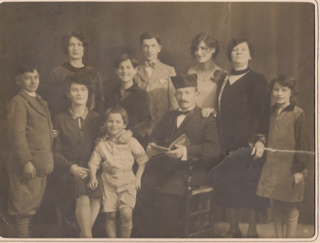Friends
Whose Life Is It Anyway: Writing About Family Secrets
When is it okay to write about family stores?
Posted October 25, 2020 Reviewed by Kaja Perina
My mother and my sister never wanted me to write about them. Ever. It wasn’t my business, I was told. I should be loyal. I should only say good things about them both. Did I want to be sued? "We have nothing to feel guilty about, so don’t make us feel that way," my mother told me. And she meant it.

And of course I did write about them. Because that was the only way I knew to try and understand everything that was going on in a family that kept secrets out of shame, people who would rather eat nails than divulge or examine something uncomfortable or painful. What are you writing about, I was always asked but I knew the question was really: are you writing about us?
Of course I was.
My debut novel Meeting Rozzy Halfway was fiercely autobiographical, a novel I had written when my sister, whom I had grown up adoring, had suddenly changed personality and had dropped out of college to marry young and have one baby and then another. Not only was I sad for her, I was miserable for me. My sister had been my anchor, my touchstone, and no one would talk about the downward turn of her life, and so I wrote a novel, in a fever, about two devoted sisters, one of whom has her life spiral out of control. I was hoping that at least on the pages of a novel, our lives together might all turn out differently and that sister would see the love and appreciation for her, and my desire to help, in every sentence. And to my shock, the book was published, and it made me famous for a while. I waited for my sister to approach me, to tell me she recognized herself in the gorgeous young woman character whose life is curtailed, but she never did, and when I finally asked her if she saw herself, she looked at me as if I had three heads. “That character isn’t me at all,” she insisted. To my surprise, I realized that the story I thought I had written for her, was really more for me, for my understanding.
But my sister wasn’t the only character in my novel who came from family. I wrote about my mom, too, a woman who had been jilted at 19 by the love of her life, who had married on the rebound, and when she was pregnant, her first love came to visit her—with his wife. She never got over it, and she began to distrust and dislike all men, including my boyfriend and my sister’s husband.
My sister’s reaction to my book made me anxious, but to my surprise, my mother recognized herself almost immediately—and with a kind of delight. Maybe because it gave her a reason to track down this guy, to tell him that her daughter had written about his bad behavior in a book. And to both our surprises, they reconnected as friends, something I thought was as strange as it was wonderful. And if my sister insisted the book had nothing of her in it, my mother happily told everyone.
Later, though, when my mother began to have the beginnings of cognitive decline, she changed her mind about my writing about her. I wanted to write about how I had become friends with the man who had jilted her, how they had become friends, too, but this time in a personal essay, rather than fiction. “I guess so,” she said, but then half an hour later she called up furious and upset. “Stay the hell out of my life!” she said. “This is my story, not yours.”
But was it? Wasn’t the fact that I was friends with the man she had loved part of my own story and not wholly hers?
Some people believe you should only write about family after they have died. You protect them. You protect yourself. But I would never tell a story about my family that did not involve me and my perceptions. But then my mother was getting older, more forgetful. She had fallen and when we put her into independent living, she called me every night, railing at what a horrifying daughter I was to do this to her. So I did what I always had done to understand things. I began to write my novel Cruel Beautiful World, and I put in a character called Iris, a woman like my mother, put into independent living. And then, as I was in the middle of writing my novel, to everyone’s astonishment, my mom, at 94, fell in love for the first time with a man named Walter, and he loved her back for four years until he died, and she followed soon after. Those four years were the most joyous of her life and I was lucky enough to be witness to them. How could I not write about that? I thought how happy my mom would have been had she known how many people said that Iris was their favorite character, how much they loved that woman because she gave them hope that love was always possible. And what brought me the most joy was that I got to give my mom a version of her best self, a kind of immortality in a book.
My sister is a different story. She has estranged herself from me because she feels I have the life she wants and that I have stolen everything good from her. She won’t talk about it, so to understand it, I write, and I write what I know, which is my memories, my side of the story. In fact, coming up next here is a piece I already had published in The Manifest-station. It’s a cri de coeur, a letter to my sister about why and how we are now so distant, how much it tears at me and breaks my heart. My sister blames and hates me, accuses me of lying and has told me she wants me dead. How can I understand something like that if there is no discourse about it, if she refuses to speak to me. And more importantly, do I have the right to tell my story, to reveal details about my sister?
I write it to understand it.
Anne Lamott says, every that happens to you belongs to you in some way, filtered through the prism of your memory. And you must tell the story through that prism.
Anne Lamott has also said that you should write about anything you want, and if people didn’t want you to write something bad about them, they should have been kinder to you. I’m not sure I totally agree with that, because trauma, conflict, is part of what makes us human and to heal it, we need to understand it. There are, of course, certain things in my sister’s life, in my mom’s, that I would never, ever divulge to anyone. Because they were told to me in confidence. Because I wasn’t there.
You might ask, when does someone else’s story become your story, too? Maybe the answer is that it was always your story all along because you were living and experiencing it.


